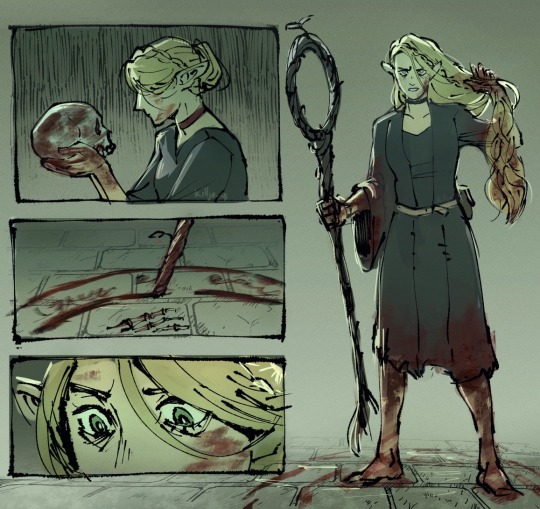Text
baby chain catshark hasn't learned how to swim yet
44K notes
·
View notes
Text
when i hear "found family" in relation to an ensemble of fictional characters in media there's two different things that could be happening here.
often it's what i think of as forced family, which is like "i found myself in a situation with these people" but a key part of the trope is that, like most families of origin, they're stuck with each other and can't leave without taking extreme action. voyager's "found family" is a forced family. i'm watching m*a*s*h now and it seems that way too. in both cases there's an outside constraint where you literally cannot escape these people and so grow to love them as a result, often in a codependent or unhealthy way but you are closer to them than you will ever be to anyone who did not share this experience. you would sell some of them to satan for one corn chip but god help any outsider who tries to break you up or even understand the situation. sometimes you get lucky and there's a person or two in there that you would choose to spend every day with regardless of circumstance (but would you really? can you even tell for sure??). but also it's "i will never ever speak to you again as long as i live but i'm really bored so can you give me a ride to the 7-11 first."
meanwhile chosen family is more like star trek the next generation where they are placed in this group at random but there's no hostage element to it. any one of them could request a transfer at any time, but they never will because this community and group of people have become an inseparable part of their identity. in both cases they'd saddle up and risk their lives to save each other forever at any personal cost ("not to me, not if it's you") but forced family also contains the element of "i'll fucking do it but christ alive." not every ensemble fits into one or the other but i think it's fun to distinguish as a concept.
526 notes
·
View notes
Text
unavoidable that you will be the villain in someone else's story. You will be painted in an unfavorable light. You will be the irredeemable one. and all of this will happen despite how nice you might usually be or how kind or how respectful or how warm. and you will just have to move on.
27K notes
·
View notes
Text
unblock me princess I have a barely relatable meme to send you
13K notes
·
View notes
Text

ballet and ballroom AUs are the foundation of my personality
2K notes
·
View notes
Text

Couldn’t sleep the other day. Drew one of my favorite scenes
31K notes
·
View notes
Text
me: oh man im starving but im not sure what i should make for dinner……
the spirit of a 12th century templar knight that died a horrific death due to torture that started haunting me after i found a sword in the middle of the woods: spaghetti once more, prithee?
me: henry you are brilliant. spaghetti it is
41K notes
·
View notes
Text
LMAO THE "WOAH HEY" FROM MARCILLE HAPPY LESBIAN VISIBILITY WEEK
25K notes
·
View notes
Text
Rolling up to the knight's guild in a chainmail brayette and low-cut mail chausses watching my fellow knights visibly fluster under their helmets as their gaze follows up to my maille voider scandalously worn without a breastplate
16K notes
·
View notes
Text
I found an extremely dope disability survival guide for those who are homebound, bedbound, in need of disability accommodations, or would otherwise like resources for how to manage your life as a disabled person. (Link is safe)
It has some great articles and resources and while written by people with ME/CFS, it keeps all disabilities in mind. A lot of it is specific to the USA but even if you're from somewhere else, there are many guides that can still help you. Some really good ones are:
How to live a great disabled life- A guide full of resources to make your life easier and probably the best place to start (including links to some of the below resources). Everything from applying for good quality affordable housing to getting free transportation, affordable medication, how to get enough food stamps, how to get a free phone that doesn't suck, how to find housemates and caregivers, how to be homebound, support groups and Facebook pages (including for specific illnesses), how to help with social change from home, and so many more.
Turning a "no" into a "yes"- A guide on what to say when denied for disability aid/accommodations of many types, particularly over the phone. "Never take no for an answer over the phone. If you have not been turned down in writing, you have not been turned down. Period."
How to be poor in America- A very expansive and helpful guide including things from a directory to find your nearest food bank to resources for getting free home modifications, how to get cheap or free eye and dental care, extremely cheap internet, and financial assistance with vet bills
How to be homebound- This is pretty helpful even if you're not homebound. It includes guides on how to save spoons, getting free and low cost transportation, disability resources in your area, home meals, how to have fun/keep busy while in bed, and a severe bedbound activity master list which includes a link to an audio version of the list on Soundcloud
Master List of Disability Accommodation Letters For Housing- Guides on how to request accommodations and housing as well as your rights, laws, and prewritten sample letters to help you get whatever you need. Includes information on how to request additional bedrooms, stop evictions, request meetings via phone, mail, and email if you can't in person, what you can do if a request is denied, and many other helpful guides
Special Laws to Help Domestic Violence Survivors (Vouchers & Low Income Housing)- Protections, laws, and housing rights for survivors of DV (any gender), and how to get support and protection under the VAWA laws to help you and/or loved ones receive housing and assistance
Dealing With Debt & Disability- Information to assist with debt including student loans, medical debt, how to deal with debt collectors as well as an article with a step by step guide that helped the author cut her overwhelming medical bills by 80%!
There are so many more articles, guides, and tools here that have helped a lot of people. And there are a lot of rights, resources, and protections that people don't know they have and guides that can help you manage your life as a disabled person regardless of income, energy levels, and other factors.
Please boost!
14K notes
·
View notes
Text
This is what peak performance looks like.
9K notes
·
View notes
Text
Music is awful. Destroy it.
53K notes
·
View notes
Text
A surprisingly helpful bit of social maneuvering I've figured out from trial and error:
Throughout your life, you are going to need things from people. Often, it's going to be on a deadline. And when that deadline passes, you generally want to know what's going on. So, you need to ask them.
There are two kinds of people, broadly, in this situation. The Shameless will tell you what the holdup is, with absolutely no regard for if the reason is "good enough". This is actually very helpful, because you get the real reason immediately, and can start working on a solution.
The Ashamed is trickier. People who are Ashamed are people who were often told they were giving excuses when they were trying to explain, and they'll often avoid you until they solve the problem on their own. This causes them and you a lot of stress, and often takes a lot longer to solve.
Long term, the strategy for dealing with people who are Ashamed is to provide a supportive environment where they're comfortable sharing any problems they're having with getting things done. But, there's a way to at least partially short-circuit that:
Provide an explanation for them.
One example might be "Hey Susan, I noticed that I don't have your report yet. Are you busy with other projects?" The readymade explanation signals that you're willing to accept an explanation, which is the big anxiety point.
Sometimes, you still won't get an honest answer- especially if the honest answer isn't "good enough" by the standards of the person who traumatized them. But, I've found that it often at least gets you a lie that lets you give them some slack or work around the problem.
Let's say that Susan has actually completely forgotten that she needed to do the report. She's horrified at herself, and completely unwilling to admit the real problem. But, she can now safely reply with "Sorry Jennifer, I've been swamped, and it got lost in the mix. I can have it to you in two days. Does that work?"
From there, so long as Susan gave an estimate for when she can actually do it, she and Jennifer can hash out a solution.
It's not a perfect solution, but it works astonishingly well for how small of a change it is.
2K notes
·
View notes




